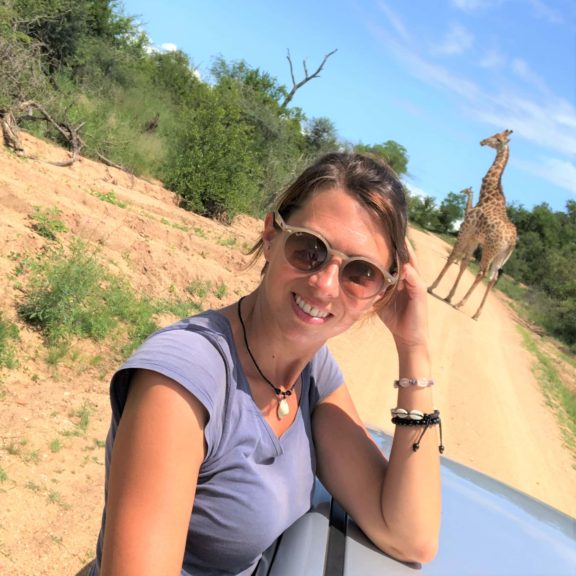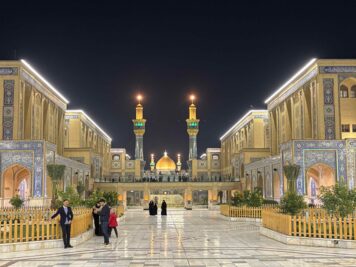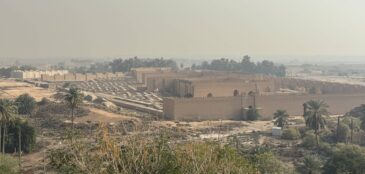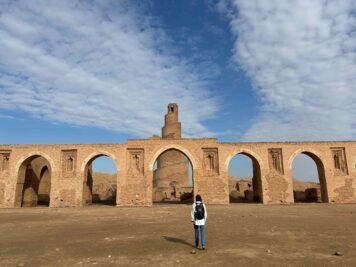I have the feeling that Burkina Faso is probably not on a lot of people’s bucketlists. As the bus we were travelling on laboured along from Fada to Ouagadougou (or Ouaga (wagga) as it’s known for short) we stopped at several checkpoints to get out and show our passports to soldiers who checked the identity of every passenger. It’s true that the northern border with Mali is definitely an area best avoided and there have been some terror attacks in cafes and restaurants in the capital, but the majority of Burkina is safe and comfortable to travel in. Still, many foreign governments have warned their citizens against visiting large swaths of the country and while there are quite a few foreigners around, Burkina Faso is not exactly overrun with travellers.
And that’s good for us, in more ways than one. We’ve noticed that there really isn’t much hassle in this region from the bane of every traveller’s existence in many other countries: the commission-seeking tout and his many friends, whose interference prevents the peaceful completion of any transaction. Touts specialise in materialising from thin air and taking any simple task you could complete yourself in a matter of minutes and turning it into an endless argument. A skilled tout will attempt to control your destiny: if you turn up at a station without a clear plan on how to get where you’re going next, he will wrestle your pack off your back and sling it up onto the roof of the vehicle of his choosing before you can so much as scream ‘Go away!’ in French, or Arabic, or Thai, or Hindi, or any of the other many languages you’ve learned it in. That’s one way to decide on your next destination; and it opens up negotiations for your new assistant’s fee, as well. Since touts tend to increase exponentially according to the number of travellers present (I should define an equation for that) – there actually aren’t a lot of them around here.
But I digress. Touts are obviously a sore spot for me.
We based ourselves in another of Burkina’s delightfully named cities, Bobo Dioulasso. Although Bobo is as close to a ‘tourist destination’ as it gets in Burkina – roaming the streets is easy and hassle-free and the local people are nice. We checked out the old town:


There isn’t much tourist-kitsch for sale, but I liked these figurines we saw at the blacksmith’s:
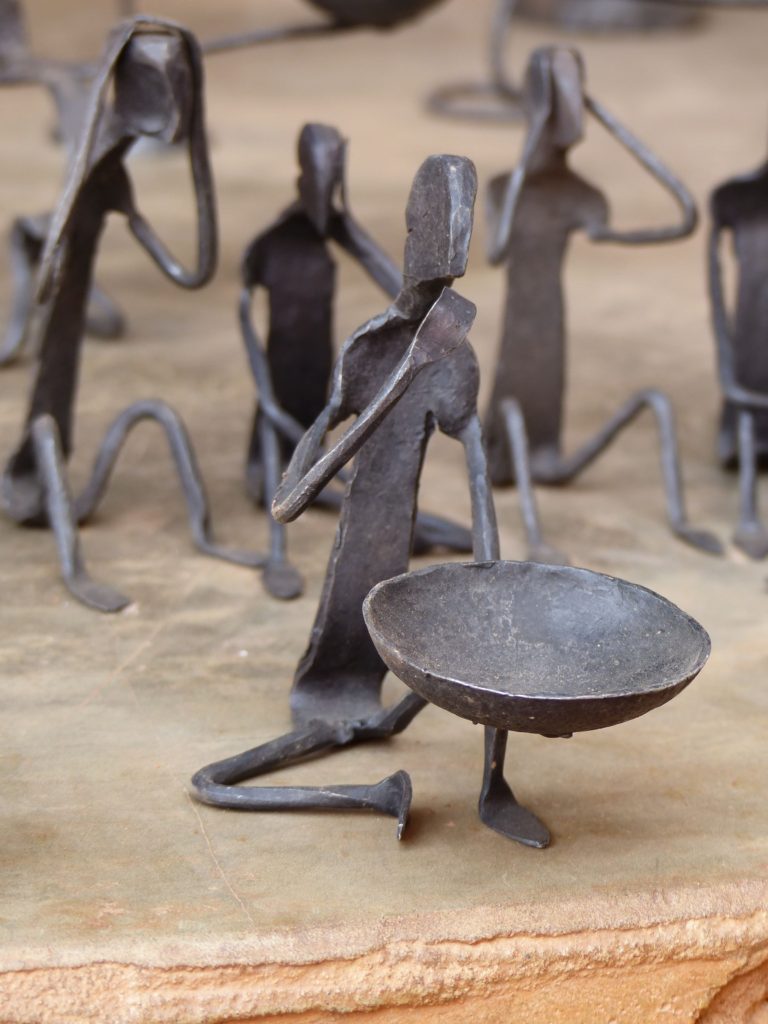
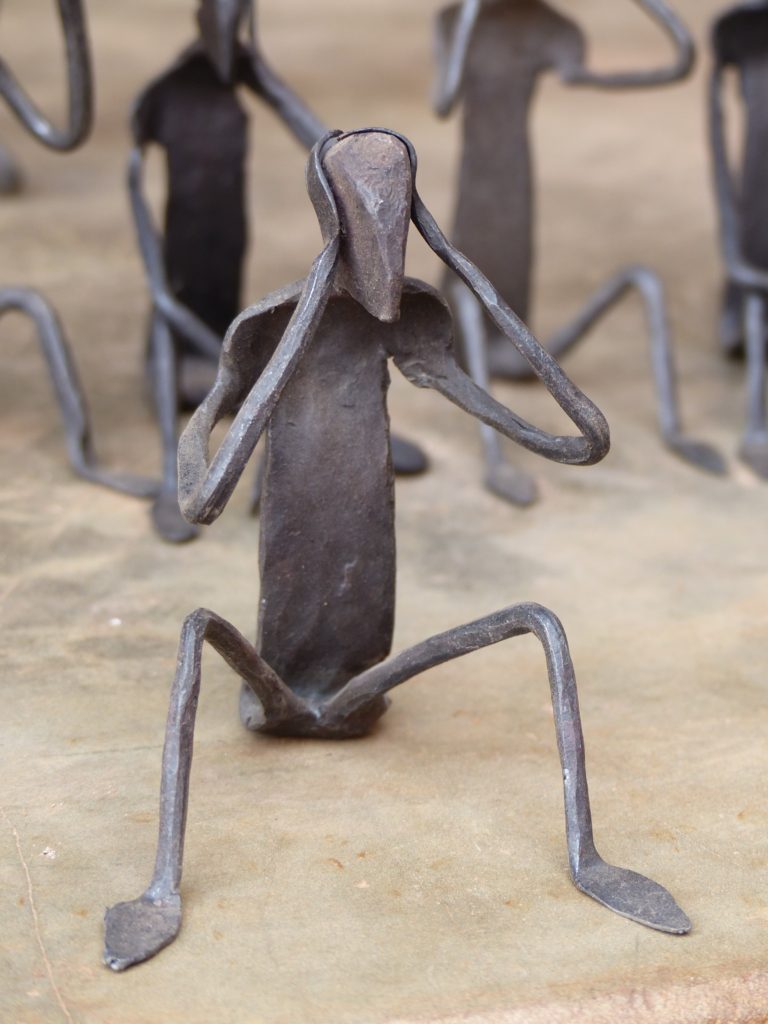
Incidentally, our friendly guide didn’t try to sell us anything extra. He only asked if we knew any girls back home looking to get married pretty soon. So, I’ve got an open marriage proposal from Burkina Faso, if anyone is interested.
We ate several times at the same place serving riz arachide (rice with peanut sauce) and many variations on ‘to’ – a starchy pasty dough with sauce, by cheap and plentiful platefuls:

Bobo’s big draw is its Grand Mosque, built in the late 1800s in the Sahel-style of mud pillars and wooden struts. It’s on the cover of one of the many guidebooks lying around our house, so it was a familiar sight to us – or would have been – if it wasn’t undergoing repairs precisely at the time of our visit. Here’s how it normally looks:
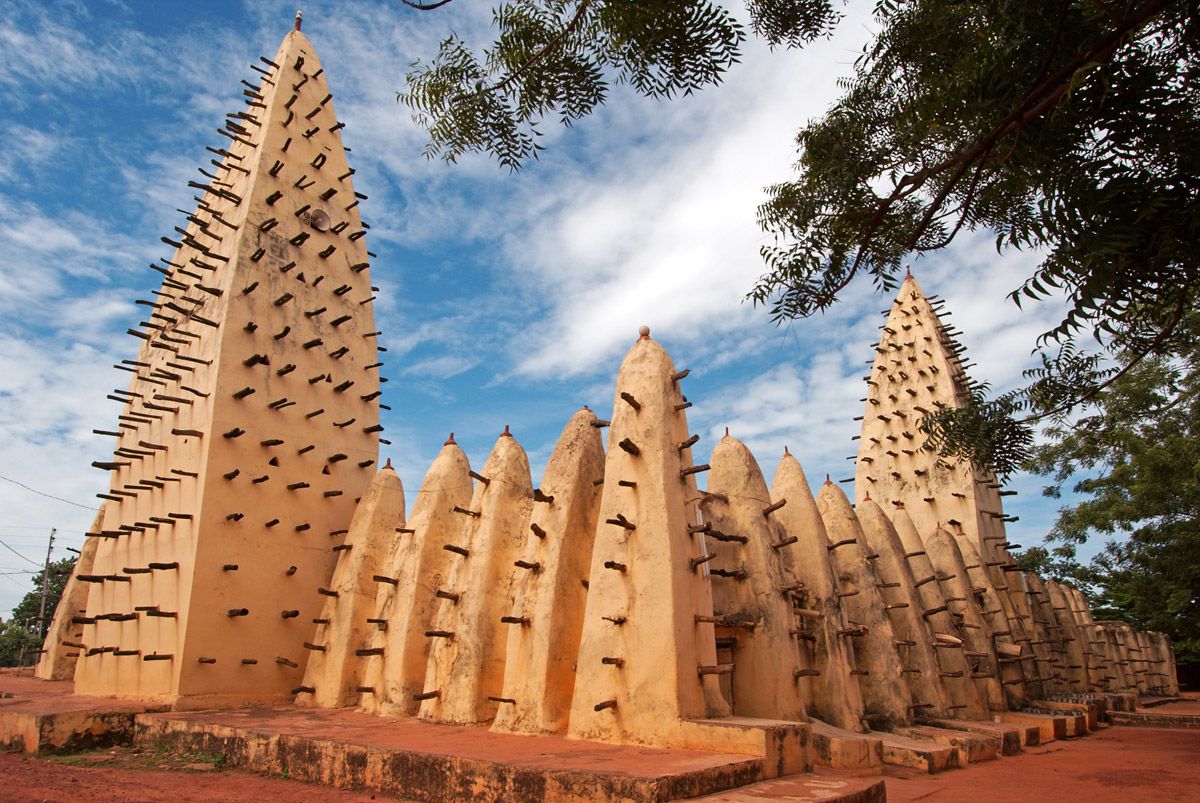
But at the moment, the whitewashed plaster coating the outsides has been removed and only the baked mud underneath shows:

Worse, the temporary fence set up around the site has proved a mecca for the few aspiring touts there are in this country – a fence presents the opportunity to charge foreigners for things which aren’t meant to cost money, such as observing a public building from the street outside.

As we drew closer, four guys materialised at our sides offering tours. Since the mosque was under construction we weren’t really interested in a guided tour, especially one offered by a random person (or four) who didn’t appear to be affiliated with the mosque anyway. We said no thanks and that’d we just take a look – from the outside – and leave. Despite there being no signs, no notices, no tickets and in fact no indication at all to the contrary, the touts argued ceaselessly that we were not free to look, or walk past, or take a photo without paying them first. They followed closely at our heels and two went so far as to jump in front of the camera.
So we gave up any chance of enjoying a walk around the mud mosque, although we did manage to get some photos from across the street.
One day we hired our own motorbike at the guesthouse, which process consisted of exchanging a photocopy of my passport for the key. I am a backseat driver. It’s ironic because I actually have no license at all, but that doesn’t matter here for any driver, backseat or otherwise. With me pointing out every person, donkey cart, and chicken crossing the road from the back of the bike, we hit the road.

As two foreigners alone on a bike we expected trouble from the police but we were only stopped once or twice at the regular checkpoints, like everybody else.
Burkina feels kind of like a crossroads in West Africa. It shares a border with six other countries, and no matter where we go, it seems any turn will lead to one or another down the road somewhere:


But we were staying in the country, heading for Banfora where we stopped for a quick bite at a local place called ‘MacDonalds’:

Then we drove for a long time into the countryside through mud brick villages, past women doing laundry in the stream and groups of children who ran out to the side of the road to wave, and take really serious-looking photos:

Eventually we reached the Karfiguela Waterfalls. The falls and rocky pools around them are a popular spot for a shady rest or a picnic, and a swim in the cool rushing water:




After that we carried on to the Domes de Fabedougou, limestone formations shaped by erosion and water over thousands of years:



Despite being another major attraction, there were only two other visitors at the time. Scrambling up the rocky domes and enjoying the view all by ourselves as the sun dipped lower in the sky and the peaks and dirt road turned red, was a magical experience.
But the sun was going down and we had a long drive back to Bobo. We made good time until we inevitably ran out of fuel and had to push the bike to the next village to buy a bottle of gas – and so the sun set. Being the only intrepid travellers on the road didn’t feel as magical anymore in the sudden freezing darkness. The light on our bike shone weakly into the blackness and only barely illuminated the road and its many potholes. What had been a fun adventure during the daytime turned into a slightly scary and very long drive creeping at a snail’s pace on the edge of the road while transport trucks blasted past. So it was with a real sense of relief that we climbed stiffly off the bike, safely back at our guesthouse. Self-driving is a lot of fun and opens us up to total freedom, but there is something to be said for an experienced moto-taxi driver, too (although Oyv is well on his way to becoming one).
Rested and recovered the next day, we headed for Tiebele. This meant going first back to Ouaga; then on to Po; and then catching a ride from there, and in the process we discovered a love/hate relationship to touts – and that there’s never one around when you need him. Sometimes finding the right vehicle on your own can actually be a bit tricky. But we found a ride and then this wonderful place to stay at:
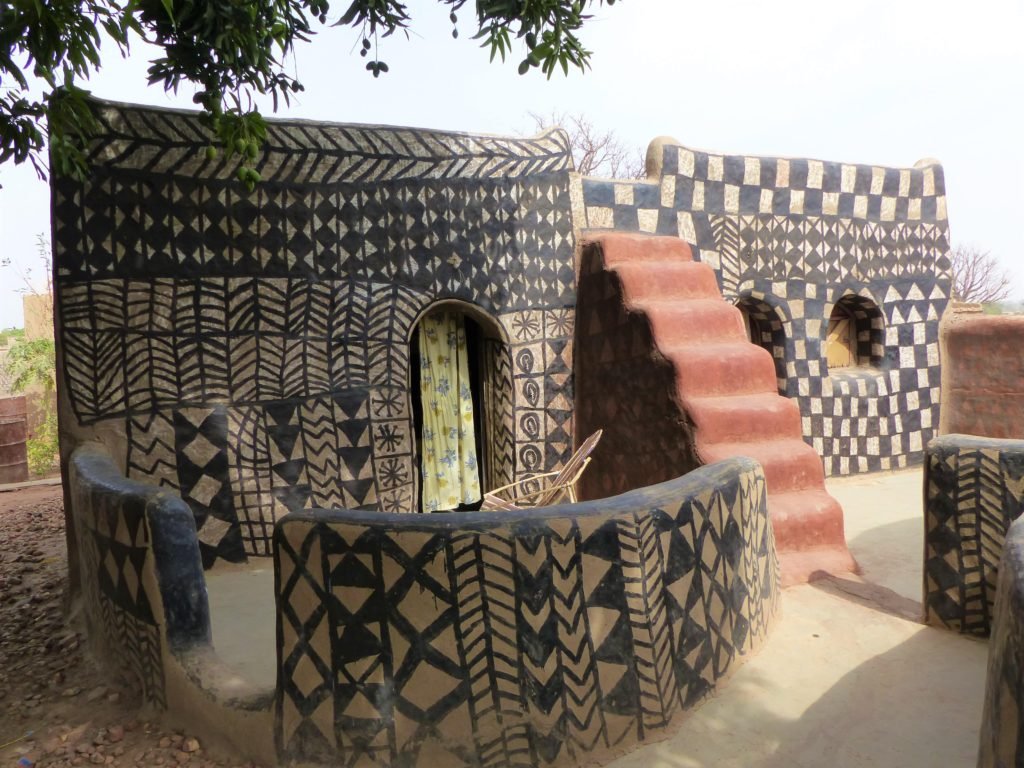
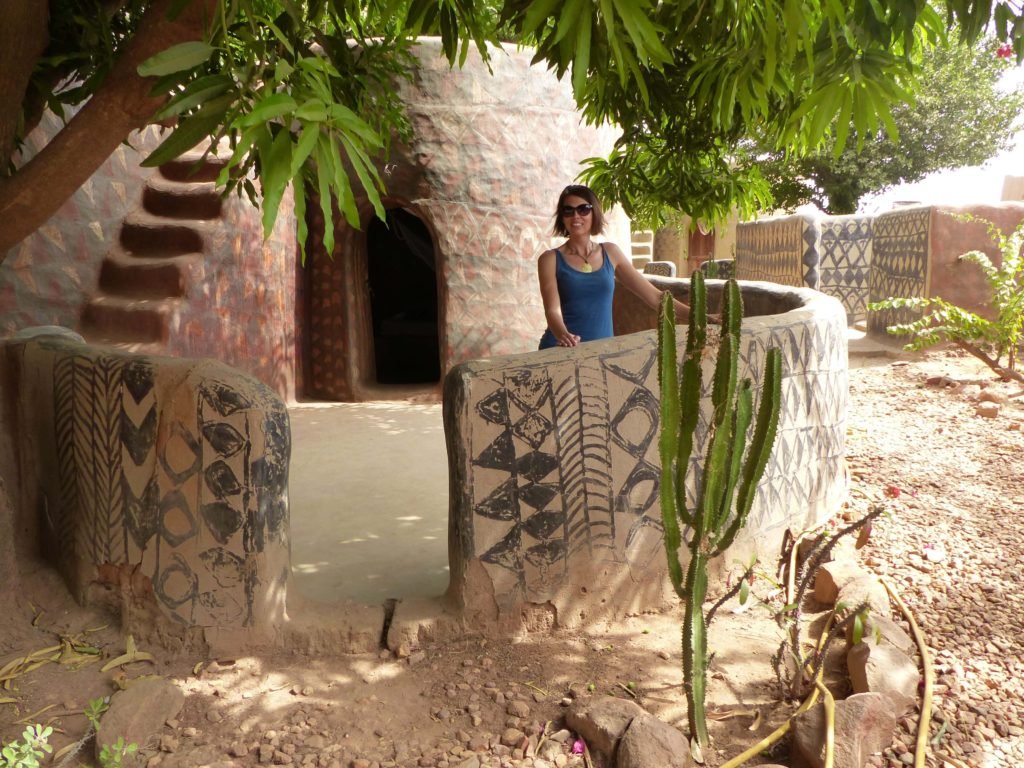
The round houses are comfortable and wildly atmospheric and there is no better way to spend an evening than up on the rooftop under the stars in the quiet of a village night.

The guesthouse’s outdoor toilets were the best we’ve seen so far. Literally, as you can see straight in from any roof top in the area:

Tiebele is the modern village built up around an old royal compound, made of hand-painted traditional houses. People still live in the compound today, much as they have always done: kids live with the grandparents, married couples have their own place, and single boys bunk together.




Traditionally for defense purposes the houses have low doorways from the outside and interconnecting rooms inside, and a bit of crawling is necessary:



Tiebele was our last stop on our way back into Ghana. As we approached the border the next day, we thought about our peaceful time spent travelling here in Burkina, without any evidence of the problems we’d read about back home, and without almost any interference from touts to hinder our progress.
So we crossed the border, shaking off the touts and money changers hovering on the other side and took one last look back at Burkina Faso:

– and then caught a ride onwards and into Ghana.
Read More
For more of our adventures (and misadventures) in Burkina Faso, check out the rest of my stories from the road.
